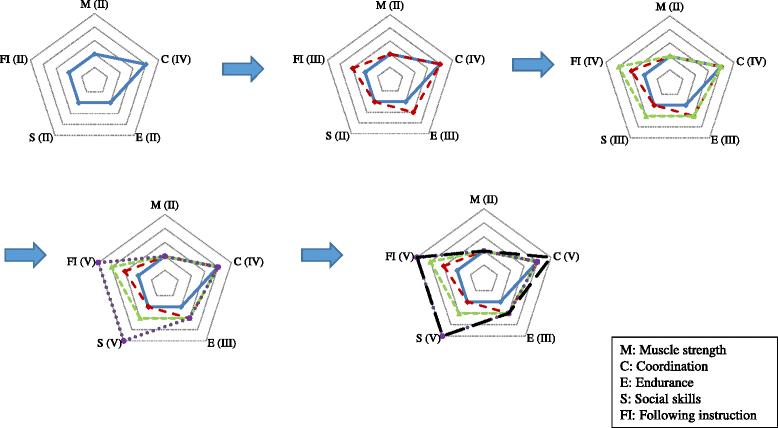Study protocol: a randomized controlled trial study on the effect of a game-based exercise training program on promoting physical fitness and mental health in children with autism spectrum disorder
- PMID: 29486750
- PMCID: PMC5830347
- DOI: 10.1186/s12888-018-1635-9
Study protocol: a randomized controlled trial study on the effect of a game-based exercise training program on promoting physical fitness and mental health in children with autism spectrum disorder
Abstract
Background: Suboptimal physical activity levels and tolerance, poor motor skills and poor physical health are demonstrated in children with Autism Spectrum Disorder (ASD). We speculate that social interaction and communication deficits in children with ASD are two major factors that hinder these children from actively participating in group physical activities. While previous studies have demonstrated that exercise intervention improves motor skills and behavioral outcomes in children with ASD, these programs tend to focus only on a single sport, which may not cater to the interests of different children with ASD. In this protocol, a game-based exercise training program designed by a multi-disciplinary team (pediatrics, physical education and psychology) will be implemented by front-line healthcare providers trained following the train-the-trainer (TTT) model and subjected to validation.
Method: Using a randomized controlled trial design, the effectiveness of the game-based exercise program will be examined for 112 young children with ASD. These children were randomly assigned to two groups, which will be tested and trained in either one of the two arms of the waitlist conditions (control and intervention). The assessment of physical and psychological traits will be conducted at baseline (pre-test), at 16-weeks (post-treatment) and at 32-weeks (follow-up) of the program.
Discussion: Most of the interventions designed for ASD children target either their psychological traits or physical conditions, without bridging the two states. With the recognition of bidirectional relations between mental and physical health, the present game-based exercise program which includes multiple level of difficulties was developed to equip ASD children with the necessary skills for engaging in sustainable team sports or even professional sport training. The program, if effective, will provide an entertaining and engaging training for whole-person development among children with ASD.
Trial registration: This study is registered with the Chinese Clinical Trial Registry ( ChiCTR-IOR-17011898 ). Registered 6th July 2017.
Keywords: Autism Spectrum Disorder; Game-based learning; Physical health; Psychological well-being; aerobic exercise.
Conflict of interest statement
Authors' information
CCWY and RCHS are Certified Strength and Conditioning Specialist through the National Strength and Conditioning Association (NSCA), SWLW is a psychologist, FSFL is a sports coach and a qualified physical education teacher in Hong Kong, DFYC is a specialist in developmental and behavioural paediatrics.
Ethics approval
This proposal is approved by Human Research Ethics Committee of the Education University (Ref. No.: 2016-2017-0223). An information fact sheet and a consent form will be distributed to the front-line healthcare providers and parents after an introductory talk of the program. They understand the benefits and risks involved in the program, and their participation in the program is voluntary. They have the right to question any part of the procedure and can withdraw at any time without negative consequences. The completed consent form will be collected by the research team before the study commences.
Consent for publication
An information fact sheet with a consent form or a parental consent form of the whole project including consent for publication will be distributed to the front-line health providers who are going to implement the exercise program and the parents respectively. They understand that information obtained from this research may be used in future research and may be published. However, their right to privacy will be retained, i.e., participants’ personal details will not be revealed.
Competing interests
The authors declare that they have no competing interests.
Publisher’s Note
Springer Nature remains neutral with regard to jurisdictional claims in published maps and institutional affiliations.
Figures
References
-
- (CDC). DDMNSYPICfDCaP: Prevalence of autism spectrum disorder among children aged 8 years - autism and developmental disabilities monitoring network, 11 sites, United States, 2010. Morbidity and mortality weekly report Surveillance summaries (Washington, DC : 2002) 2014, 63(2):1-21. - PubMed
-
- Woo EKF, Lam LL. CAS Epidemiological Data on Autistic Spectrum Disorder from 2003- 2005. In: Child Assessment Service Epidemiology and Research Gnlletin. Hong Kong: Child Assessment Service. Hong Kong Special Adminstrative Region of the People's Republic of China: Department of Health. p. 2007.
-
- American Psychiatric Association: Diagnostic and Statistical Manual of Mental Disorders (DSM-5), 5 edn. Arlington: American Psychiatric Association; 2013.
Publication types
MeSH terms
LinkOut - more resources
Full Text Sources
Other Literature Sources
Medical



